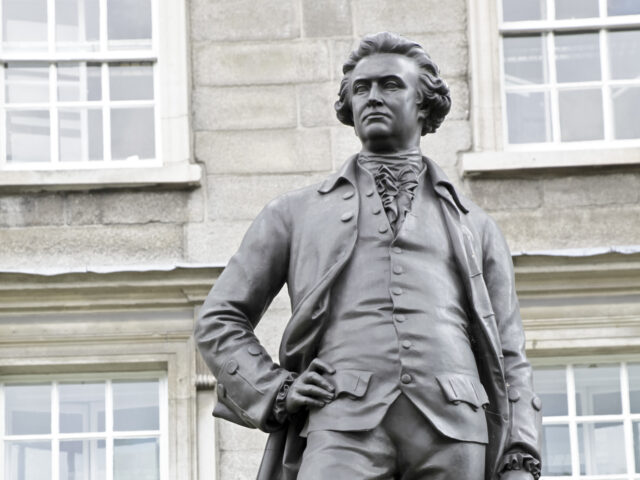British statesman and slavery abolitionist Edmund Burke, widely regarded as one of the fathers of conservativism, has been added to a BLM-inspired shame list by UK parliamentarians for historical figures with supposed connections to the slave trade.
Despite never owning slaves himself, and his fierce opposition to the barbaric practice, Edmund Burke’s statues and portraits are now under review for possible removal from the Palace of Westminster by a group of MPs tasked with assessing the building’s artwork to see if they fall in line with woke progressive standards.
According to a report from The Times of London, the father of conservatism has been listed in a review of those who “supported slavery [or] had financial or family interests in the transatlantic slave trade and slavery,” due to his brother profiting from slave plantations in the Caribbean. There is no suggestion that Burke himself profited, however.
The review, which was sparked by the resurgence of the Black Lives Matter movement in Britain in 2020 following the death of George Floyd in America, will seek to transform Parliament’s art collection to become “more representative of diversity”. The cross-party review is being led by Speaker Sir Lindsay Hoyle’s advisory committee on works of art in the House of Commons and is chaired by Conservative MP Dean Russell.
The addition of Burke has led to backlash on historical grounds, with King’s College, Cambridge professor of political thought Richard Bourke describing his inclusion on the list as “nonsense”.
“It’s definitely nonsense that Burke was a supporter of the slave trade. He was a critic of slavery from his first recorded views. He found it abhorrent,” he told The Telegraph.
“Being an abolitionist is a little more complicated. He supported immediate abolition in the late 1780s, but then retracted during the French Revolution. The moment, he thought, was not right.
“In general terms Burke opposed slavery but not its forthright abolition. Before abolition, he proposed alleviating the barbarities of the trade itself. Given these complexities, there are commentators out there who conclude that because he had a scheme for reforming the trade he was a supporter of it. Ideology knows no bounds,” he said.
Burke had also campaigned for the impeachment of the governor of Bengal, Warren Hastings, over the colonial injustice under his rule.
An Irish-born British statesman who served in Parliament as a Whig from 1766, Burke’s writings have become central to political conservatism, notably in the United States. Burke, who expressed sympathy for the American Revolution, is perhaps best known for his 1790 pamphlet Reflections on the Revolution in France, which accurately predicted that the leftist revolution would descend into a bloody tyranny.
Praising Burke as a figure of conservative admiration, British wartime leader Sir Winston Churchill wrote in his 1932 essay Consistency in Politics that Burke was the “foremost apostle of Liberty, on the other as the redoubtable champion of authority”.
“His soul revolted against tyranny, whether it appeared in the aspect of a domineering Monarch and a corrupt Court and Parliamentary system, or whether, mouthing the watch-words of a non-existent liberty, it towered up against him in the dictation of a brutal mob and wicked sect.”
Follow Kurt Zindulka on Twitter here @KurtZindulka

COMMENTS
Please let us know if you're having issues with commenting.